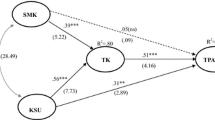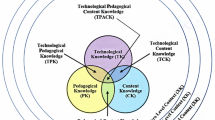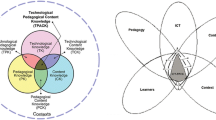Abstract
This long-term single group study was conducted with pre-service special education elementary teachers taking a required graduate level course on integrating technology into mathematics and science instruction in a New York City public University. The purpose of this study was to explore whether Technological Knowledge (TK), Pedagogical Knowledge (PK), Content Knowledge in mathematics and science (CKM and CKS) and Technological Pedagogical Content Knowledge (TPACK) are independent constructs in the TPACK framework and to develop instruments for assessment of each basic domain of the theoretical TPACK framework. Exploratory and confirmatory factor analyses of the developed instruments suggest that the TPACK construct is independent from TK, PK, CKM and CKS. Further analysis using multiple linear regression showed that TK, PK, and CK are not predictors of TPACK. These findings provide an opportunity for independent assessment of different types of teacher knowledge defined by the TPACK framework. This could help teacher preparation programs to evaluate effectiveness of courses that prepare teachers for integration of technology.
Similar content being viewed by others
Explore related subjects
Discover the latest articles, news and stories from top researchers in related subjects.References
Abbitt, J. T. (2011). Measuring technological pedagogical content knowledge in preservice teacher education: A review of current methods and instruments. Journal of Research on Technology in Education,43(4), 281–300.
Archambault, L. (2016). Exploring the use of qualitative methods to examine TPACK. In Handbook of technological pedagogical content knowledge for educators, 65-86.
Archambault, L. M., & Barnett, J. H. (2010). Revisiting technology pedagogical content knowledge: Exploring the TPACK framework. Computers & Education,55, 1656–1662.
Baran, E., Chuang, H. H., & Thompson, A. (2011). TPACK: An emerging research and development tool for teacher educators. TOJET: The Turkish Online Journal of Educational Technology,10(4), 370–377.
Bos, B. (2011). Professional development for elementary teachers using TPACK. Contemporary Issues in Technology & Teacher Education,11(2), 167–183.
Brantley-Dias, L., & Ertmer, P. A. (2013). Goldilocks and TPACK: Is the construct ‘just right?’. Journal of Research on Technology in Education,46(2), 103–128.
Cattell, R. B. (1966). The scree test for the number of factors. Multivariate Behavioral Research, 1, 245–276.
Chai, C. S., Koh, J. H. L., & Tsai, C. C. (2010). Facilitating preservice teachers’ development of technological, pedagogical, and content knowledge (TPACK). Educational Technology & Society,13(4), 63–73.
Chai, C. S., Ng, E. M., Li, W., Hong, H. Y., & Koh, J. H. (2013). Validating and modelling technological pedagogical content knowledge framework among Asian preservice teachers. Australasian Journal of Educational Technology,29(1), 41–53.
Cherner, T., & Smith, D. (2016). Reconceptualizing TPACK to meet the needs of twenty-first-century education. The New Educator. https://doi.org/10.1080/1547688x.2015.1063744.
Child, D. (2006). The essential of factor analysis. New York, NY: Continuum.
Dawson, V. (2008). Use of information and communication technology by early career science teachers in Western Australia. International Journal of Science Education,30(2), 203–219.
Dong, Y., Chai, C. S., Sang, G. Y., Koh, J. H. L., & Tsai, C. C. (2015). Exploring the profiles and interplays of pre-service and in-service teachers’ technological pedagogical content knowledge (TPACK) in China. Journal of Educational Technology & Society,18(1), 158–169.
Field, A. (2013). Discovering statistics using SPSS. Thousand Oaks, CA: Sage Publications.
George, D., & Mallery, P. (2001). SPSS for windows. Needham Heights, MA: Allyn & Bacon.
Goldenberg, E. P. (2000). Thinking (and talking) about technology in math classrooms. Issues in Mathematics Education, 1–8.
Goldring, R., Gray, L., & Bitterman, A. (2013). Characteristics of public and private elementary and secondary school teachers in the United States: Results from the 2011–12 Schools and Staffing Survey (NCES 2013-314). U.S. Department of Education. Washington, DC: National Center for Education Statistics. Retrieved December, 23 2018 from http://nces.ed.gov/pubsearch.
Graham, C. R. (2011). Theoretical considerations for understanding Technological Pedagogical Content Knowledge (TPACK). Computers & Education,57(3), 1953–1969.
Gray, L., Thomas, N., & Lewis, L. (2010). Teachers’ use of educational technology in US public schools: 2009. First Look. NCES 2010-040. National Center for Education Statistics.
Green, S. B. (1991). How many subjects does it take to do a regression analysis? Multivariate Behavioral Analysis,26, 499–510.
Grossman, P. L. (1989). A study in contrast: Sources of pedagogical content knowledge for secondary English. Journal of teacher education,40(5), 24–31.
Harris, J., Grandgenett, N., & Hofer, M. J. (2010). Testing a TPACK-based technology integration assessment rubric. Society for Information Technology and Teacher Education.
Hofer, M., & Grandgenett, N. (2012). TPACK development in teacher education: A longitudinal study of preservice teachers in a secondary MA Ed. program. Journal of Research on Technology in Education,45(1), 83–106.
Hughes, J., (2008). In-service teachers’ use and development of TPCK within technology inquiry groups. In Symposium paper presented at the annual American educational research association conference, New York, USA.
Hutcheson, G., & Sofroniou, N. (1999). The multivariate social scientist. London: Sage.
Hutchison, A., & Reinking, D. (2011). Teachers’ perceptions of integrating information and communication technologies into literacy instruction: A national survey in the U.S. Reading Research Quarterly,46(4), 308–329.
Kaplon-Schilis, A., & Lyublinskaya, I. (2015). Exploring changes in technological knowledge (TK), pedagogical knowledge (PK), content knowledge (CK) and TPACK of pre-service special education teachers taking technology-based pedagogical course. In Proceedings of society for information technology & teacher education international conference 2015 (pp. 2936–2943). Chesapeake, VA: Association for the Advancement of Computing in Education (AACE).
Kartal, T., & Afacan, Ö. (2017). Examining Turkish pre-service science teachers’ Technological Pedagogical Content Knowledge (TPACK) based on demographic variables. Journal of Turkish Science Education,14(1), 1–22.
Koehler, M. J., & Mishra, P. (2009). What is technological pedagogical content knowledge? Contemporary Issues in Technology and Teacher Education,9(1), 60–70.
Koehler, M. J., Shin, T. S., & Mishra, P. (2011). How do we measure TPACK? Let me count the ways. In R. Ronau, C. Rakes, & M. Niess (Eds.), Educational technology, teacher knowledge, and classroom impact: A research handbook on frameworks and approaches (pp. 16–31). Hershey, PA: IGI Global.
Koh, J. H. L., Chai, C. S., & Tsai, C. C. (2014). Demographic factors, TPACK constructs, and teachers’ perceptions of constructivist-oriented TPACK. Journal of Educational Technology & Society,17(1), 185–196.
Lee, M. H., & Tsai, C. C. (2010). Exploring teachers’ perceived self-efficacy and technological pedagogical content knowledge with respect to educational use of the World Wide Web. Instructional Science,38(1), 1–21.
Lin, T. C., Tsai, C. C., Chai, C. S., & Lee, M. H. (2013). Identifying science teachers’ perceptions of technological pedagogical and content knowledge (TPACK). Journal of Science Education and Technology,22(3), 325–336.
Lyublinskaya, I., & Tournaki, N. (2012). The effects of teacher content authoring on TPACK and on student achievement in algebra: Research on instruction with the TI-Nspire handheld. In R. Ronau, C. Rakes, & M. Niess (Eds.), Educational technology, teacher knowledge, and classroom impact: A research handbook on frameworks and approaches (pp. 295–322). Hershey, PA: IGI Global.
Lyublinskaya, I., & Tournaki, N. (2014). A study of special education teachers’ TPACK development in mathematics and science through assessment of lesson plans. Journal of Technology and Teacher Education,22(4), 449–470.
Mishra, P., & Koehler, M. (2006). Technological pedagogical content knowledge: A framework for teacher knowledge. The Teachers College Record,108(6), 1017–1054.
Mishra, P., Koehler, M. J., & Kereluik, K. (2009). Looking back to the future of educational technology. TechTrends, 53(5), 48–53.
Mouza, C. (2016). Developing and assessing TPACK among pre-service teachers. Handbook of technological pedagogical content knowledge (TPACK) for educators (pp. 169–188).
Mueller, J. (2010, March). Observational measures of technological, pedagogical, content knowledge (TPACK) in the integration of laptop computers in elementary writing instruction. In Society for information technology & teacher education international conference (pp. 3907–3910). Association for the Advancement of Computing in Education (AACE).
Niess, M. L. (2005). Preparing teachers to teach science and mathematics with technology: Developing a technology pedagogical content knowledge. Teaching and Teacher Education,21(5), 509–523.
Niess, M. L. (2008). Knowledge needed for teaching with technologies–Call it TPACK. AMTE Connections,17(2), 9–10.
Niess, M. L. (2011). Investigating TPACK: Knowledge growth in teaching with technology. Journal of educational computing research,44(3), 299–317.
Niess, M. L., Ronau, R. N., Shafer, K. G., Driskell, S. O., Harper, S. R., Johnston, C., et al. (2009). Mathematics teacher TPACK standards and development model. Contemporary Issues in Technology and Teacher Education,9(1), 4–24.
Niess, M. L., van Zee, E. H., & Gillow-Wiles, H. (2010). Knowledge growth in teaching mathematics/science with spreadsheets: Moving PCK to TPACK through online professional development. Journal of Digital Learning in Teacher Education,27(2), 42–52.
Nunnally, J. C., & Bernstein, I. H. (1994). Psychometric theory. New York, NY: McGraw-Hill.
O’Bannon, B. W., & Puckett, K. (2010). Preparing to use technology: A practical guide to curriculum integration. Boston, MA: Pearson.
Ottenbreit-Leftwich, A., Glazewski, K., Newby, T., & Ertmer, P. (2010). Teacher value beliefs associated with using technology: Addressing professional and student needs. Computers & Education,55(3), 1321–1335.
Özgün-Koca, S., Meagher, M., & Edwards, M. (2010). Preservice teachers’ emerging TPACK in a technology-rich methods class. Mathematics Educator,19(2), 10–20.
Pamuk, S., Ergun, M., Cakir, R., Yilmaz, H. B., & Ayas, C. (2015). Exploring relationships among TPACK components and development of the TPACK instrument. Education and Information Technologies,20(2), 241–263.
Pohlmann, J. T. (2004). Use and interpretation of factor analysis in The Journal of Educational Research: 1992–2002. The Journal of Educational Research,98(1), 14–23.
Schmidt, D. A., Baran, E., Thompson, A. D., Mishra, P., Koehler, M. J., & Shin, T. S. (2009). Technological pedagogical content knowledge (TPACK) the development and validation of an assessment instrument for preservice teachers. Journal of Research on Technology in Education,42(2), 123–149.
Schonrock-Adema, J., Heijne-Penninga, M., Van Hell, E. A., & Cohen-Schotanus, J. (2009). Necessary steps in factor analysis: enhancing validation studies of educational instruments. Medical Teacher,31, e226–e232.
Shinas, V. H., Yilmaz-Ozden, S., Mouza, C., Karchmer-Klein, R., & Glutting, J. J. (2013). Examining domains of technological pedagogical content knowledge using factor analysis. Journal of Research on Technology in Education,45(4), 339–360.
Shulman, L. S. (1986). Those who understand: Knowledge growth in teaching. Educational researcher,15(2), 4–14.
Stevens, J. P. (2002). Applied multivariate statistics for the social sciences (4th Ed.). Hillsdale, NJ: Erlbaum.
Tavakol, M., & Dennick, R. (2011). Making sense of Cronbach’s alpha. International Journal of Medical Education,2, 53–55.
Tondeur, J., van Braak, J., Sang, G., Voogt, J., Fisser, P., & Ottenbreit-Leftwich, A. (2012). Preparing pre-service teachers to integrate technology in education: A synthesis of qualitative evidence. Computers & Education,59(1), 134–144.
U.S. Department of Education (2017) Reimagining the role of technology in higher education: A supplement to the National Education Technology Plan. Washington, D.C.: Author, Office of Educational Technology. Retrieved January 31, 2018 from https://tech.ed.gov/files/2017/01/Higher-Ed-NETP.pdf
Author information
Authors and Affiliations
Corresponding author
Ethics declarations
Conflict of interest
The authors declare that they have no conflict of interest.
Ethical Approval
All procedures performed in studies involving human participants were in accordance with the ethical standards of the institutional and/or national research committee and with the 1964 Helsinki declaration and its later amendments or comparable ethical standards. For this type of study formal consent is not required.
Additional information
Publisher's Note
Springer Nature remains neutral with regard to jurisdictional claims in published maps and institutional affiliations.
Rights and permissions
About this article
Cite this article
Kaplon-Schilis, A., Lyublinskaya, I. Analysis of Relationship Between Five Domains of TPACK Framework: TK, PK, CK Math, CK Science, and TPACK of Pre-service Special Education Teachers. Tech Know Learn 25, 25–43 (2020). https://doi.org/10.1007/s10758-019-09404-x
Published:
Issue Date:
DOI: https://doi.org/10.1007/s10758-019-09404-x








